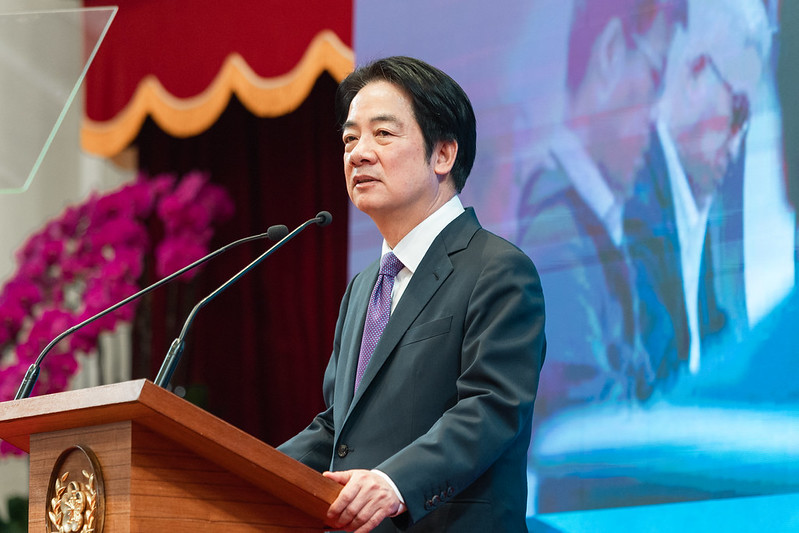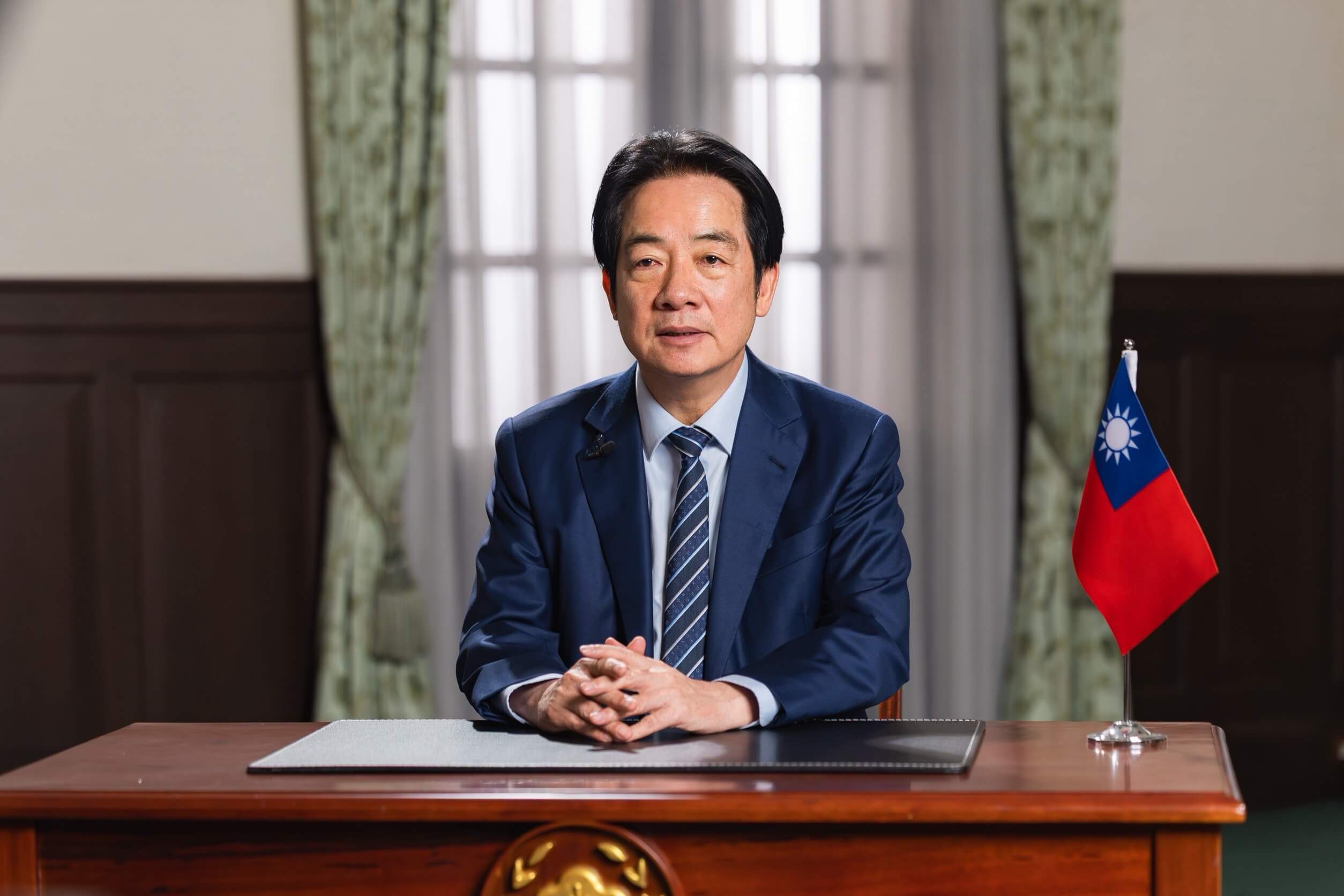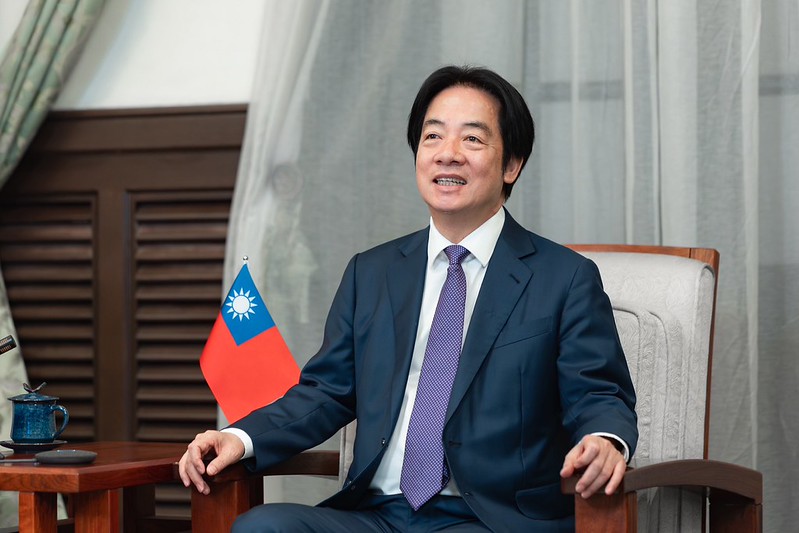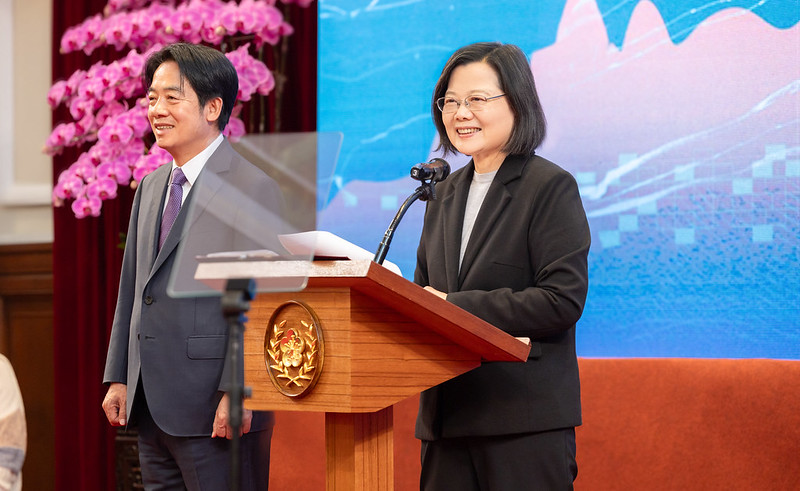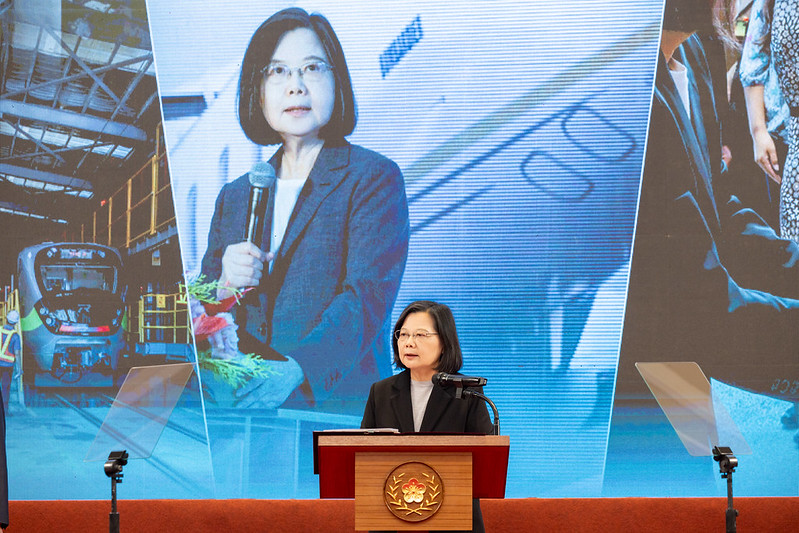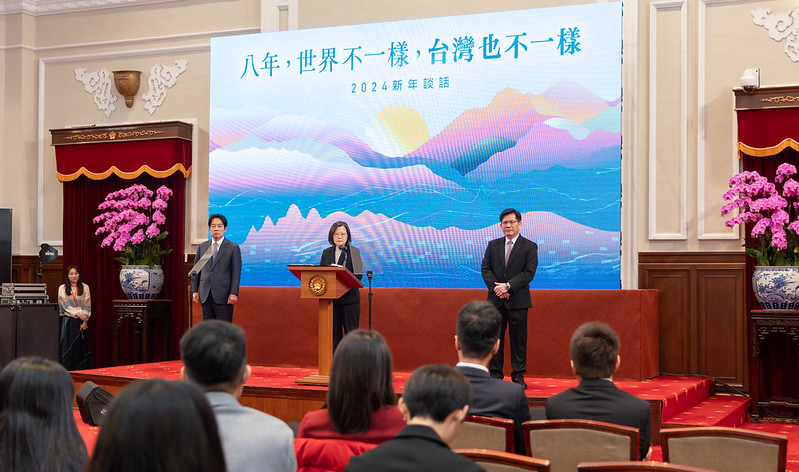News & activities
 News releases
News releases
On the morning of January 1, President Tsai Ing-wen delivered her 2024 New Year's Address in the Reception Hall of the Presidential Office. In remarks, President Tsai mentioned that this is the last New Year's Day of her eight years as president of the Republic of China. Over these past eight years, the president said, we have kept our promises and maintained the status quo, we have continued to defend democracy and protect peace, we have done our utmost to strengthen the nation and lighten economic pressures, thus continuing to strengthen the nation and care for our people. By diversifying risks and expanding globally, the president added, we grow more resilient and able to stand firm on the global stage. Noting that she is leaving behind a Taiwan of the world, the president said that today's Taiwan is known the world over, and that Taiwan attracts the global community and has achieved global recognition.
A translation of President Tsai's remarks follows:
On this first day of 2024, I want to wish all the citizens of Taiwan a happy new year.
I remember telling everyone, at this same time last year, that we would soon face the serious challenges following the COVID-19 pandemic, including international inflation and a slowdown of the global economy.
But as we reflect on the past year, we also see Russia's continued invasion of Ukraine as well as ongoing conflict between Israel and Hamas.
The global landscape has also undergone dramatic changes, not just in the past year, but over the past eight years.
An unprecedented pandemic challenged the trust between people around the world while also testing mutual assistance between countries. And increasingly frequent extreme weather events have also impacted the resilience and response capabilities of governments in many countries.
Renewed conflict between freedom and democracy versus authoritarianism not only affects geopolitical stability, but also impacts the restructuring of global supply chains.
The world has changed these past eight years. Democracy and freedom are not just values we espouse; they stand as a fortress within geopolitics that we must defend. But even more than that, they form an essential core of global supply chains.
Certainly, Taiwan has also changed these past eight years. And what has changed is that Taiwan is no longer overlooked. While the 23.5 million people of Taiwan have participated in the world's changes, they have also participated in changing the world.
Were you to ask me what keyword would best relate to Taiwan over the past eight years, I would say the "world"; and as for the keyword best relating to the world, it is certainly "Taiwan."
These past eight years, we have kept our promises and maintained the status quo. We have also shown our determination and strengthened our national defense.
Over that time, we have completed 27 Brave Eagle jet trainers and we have also launched the prototype of our first indigenous submarine, Narwhal. From the review of our defense strategy, the modernization of our weapons and equipment, and the buildup of our civil defense system, to the enhancement of our military training, our comprehensive national defense reform is well underway.
However, we neither provoke nor yield. Instead, with our solid credibility, we win the trust of the international community and deepen cooperation with our democratic partners. In this way, we can face the world with confidence and resolve, and we can also be calm and self-assured in facing China.
Today, "Taiwan Can Help" is an initiative recognized by the world. When assistance is needed in the international community, Taiwan is there to provide its support; when natural disasters occur on the other side of the Taiwan Strait, Taiwan is there to offer aid.
As we further our international cooperation, we hope that the two sides of the Taiwan Strait can take on shared responsibilities. We hope that the two sides will soon resume healthy and orderly exchanges. We also hope, by way of peace, parity, democracy, and dialogue, to jointly seek a long-term, stable way forward for our peaceful coexistence.
As the world sees renewed conflict between freedom and democracy versus authoritarianism, Taiwan's choice remains this: we continue to defend democracy and protect peace.
The total defense budget for this year will reach a new high of NT$600.7 billion. I must emphasize that for peace, goodwill is necessary, but strength is crucial. And for the international community to help defend Taiwan and maintain peace and stability across the Taiwan Strait, the most important pillar of support is Taiwan's determination to defend itself.
We must show staunch determination, protect our free and democratic way of life, and reinforce the global belief that Taiwan is not an expendable member, but rather one that plays a key role in, and is essential to, global peace and democracy.
Safeguarding peace and stability in the Taiwan Strait and the region is not only the current consensus of the international community, but also the shared responsibility of the two sides of the strait. It is not only a shared mission across Taiwan's political parties, but also the shared expectation of Taiwan's 23.5 million people.
Over the past eight years, we have done our utmost to strengthen the nation and lighten economic pressures. By implementing the Forward-looking Infrastructure Development Program, 5+2 innovative industries plan, and our Six Core Strategic Industries policy, we have improved the investment environment and strengthened the nation's economic structure, while also reducing the gap between urban and rural areas and enhancing overall quality of life.
Our GDP has shown significant growth, rising from NT$17.5 trillion eight years ago to over NT$23 trillion last year. Since the day I took office in 2016, the Taiwan Stock Index has risen from 8,131 points to 17,930 points as of closing last Friday, the last trading day of the year. That not only set a new high for last year, but even outperformed Hong Kong's Hang Seng Index.
Taiwan, with a population of 23.5 million, is already the world's 21st largest economy, and our national competitiveness has risen to sixth worldwide in certain rankings.
However, I know that due to pressures on commodity and housing prices as a result of the pandemic and inflation, people feel there is a gap between their livelihoods and those economic indicators.
We are therefore doing everything we can to implement fair and just social redistribution of the fruits of economic growth to lighten economic pressures.
For example, over the past few years we have initiated tax reforms, increasing both exemptions and deductions, so that 3.05 million households and approximately 47 percent of citizens in Taiwan need not pay individual income taxes.
Our budget for long-term care, which was NT$5.4 billion when I took office, will surpass NT$87.6 billion this year. The budget for our national childcare policy for ages 0–6 has risen from NT$15 billion in 2016 to over NT$110 billion this year.
We have also raised the minimum wage for eight consecutive years, from NT$20,008 to this year's NT$27,470, which officially begins today. The Minimum Wage Act will also officially enter into force today.
In particular, to address the era of slower global growth in the wake of the pandemic, we must continue to stabilize people's livelihoods and promote equality as we move on to the next stage by continuing to strengthen the nation and care for our people.
Therefore, starting today, monthly childcare subsidies will be raised once again. The subsidy for publicly funded daycare will be increased from NT$5,500 to NT$7,000, and the subsidy for quasi-public daycare will be raised from NT$8,500 to NT$13,000.
Students attending private junior colleges, colleges, or universities will be provided NT$35,000 in subsidies each year for tuition and fees, starting with the new semester in February this year.
There is still a long way to go to achieve housing justice. However, my administration's goal of reaching 200,000 social housing units is set to be achieved by late 2024, and we will implement version 2.0 of the differential tax rate for house tax this year.
I also want to reassure workers. Before I leave office, we will allocate over NT$300 billion to supplement the Labor Insurance Fund. The government will not go bankrupt, and neither will the Labor Insurance Fund.
I also want to assure everyone concerned about our fiscal discipline that Taiwan's debt-to-GDP ratio has gone down from 32.97 percent when I first took office to 27.17 percent as of the end of last November. At the end of my eight years in office, we will have paid off over NT$900 billion in debt.
My administration will be one that has paid off the most national debt, and we will not be leaving debt to future generations. I will act responsibly by leaving our national finances in sound condition so that future administrations will be more able to continue caring for the people.
Over these past eight years, we have diversified risks and expanded globally. Taiwan's growth in exports has exceeded 70 percent compared to 2016. This includes over 50 percent growth in exports to Europe, over 60 percent to New Southbound Policy countries, more than 70 percent to Japan, and, notably, more than 120 percent to the United States.
Taiwan is engaging with the world, and the world is engaging with Taiwan. Our "Three Major Programs for Investing in Taiwan" have helped bring in a total of NT$2.1 trillion in investment from Taiwanese firms, while foreign investment has exceeded NT$2.4 trillion.
After several years of hard work, we have changed course and reduced our over-reliance on a single market. We have departed completely from the approach of the previous administration, which attempted to rely on the Economic Cooperation Framework Agreement (ECFA) to make Taiwan just like Hong Kong by taking an accelerated path to economic integration with China.
Cross-strait economic and trade relations have now become healthier and more orderly. China is now much more reliant on imports of high-tech products from Taiwan than our traditional industries are on exports to the Chinese market.
The significant increase in Taiwan's economic strengths has changed the dynamics of our interactions with China's economy. As a result, we now have more room on the international stage.
An agreement between Taiwan and Korea to prevent double taxation entered into effect today. Also, Taiwan and the US just last year signed the first agreement under the Taiwan-US Initiative on 21st-Century Trade. That was followed by the signing of an enhanced trade partnership arrangement with the UK, and a foreign investment promotion and protection arrangement with Canada.
These trade agreements have been made in response to the new global landscape. Our key steps forward with these agreements have helped us break free of the tendency to engage with China before engaging with the world, a tendency followed by the previous administration.
Today's Taiwan can engage directly with the world. Taiwan's semiconductor and high-tech industries are indispensable engines that help keep global supply chains operating.
The need to diversify and de-risk brought on by an unprecedented pandemic and extreme climate has opened our eyes to the fact that Taiwan must continue to grow more resilient and stand firm on the global stage, while also playing a more important role in the global economy.
Though the three years of the COVID-19 pandemic are now behind us, epidemics will continue to challenge global society. And while we were able to weather both SARS and COVID-19, we still need to make further adjustments to our National Health Insurance system and to provide our primary healthcare workers with more reasonable wages and working environments to enhance the resilience of our healthcare system.
Though we have left behind the days when our electrical operating reserve was just 1.64 percent – a remnant of the previous administration – and though the annual generation capacity of renewable energy now exceeds that of nuclear energy, we still need to make faster progress in our energy transition.
Expediting the development of renewable energy is the only way to maintain the global competitiveness of Taiwan's industries. At the same time, we need to improve grid decentralization and accelerate the development and construction of energy storage systems.
Taiwan must continue to enhance energy resilience to align with the global goals set at COP28 of tripling renewable energy capacity and doubling energy efficiency improvements by 2030, so that we can achieve net-zero emissions by 2050.
We must continue to promote economic transformation while maintaining our global leadership in groundbreaking technology. And with the world's most comprehensive industrial ecosystem as our foundation, we must enhance Taiwan's ability to respond to economic coercion and firmly maintain our central position in supply chains underpinned by democratic values.
My fellow citizens, this is the last New Year's Day of my eight years as president of the Republic of China.
Regardless of whether you are one of my supporters or my critics, I want to thank all the people of Taiwan. While there have been ups and downs, we have weathered them together and taken our country to where it is today.
If someone were to ask me what my legacy for Taiwan is, I would say that I am leaving behind a Taiwan of the world.
After these eight years, today's Taiwan is known the world over. When you tell people from around the world that you are from Taiwan, these days more and more people know exactly where our home is.
Today's Taiwan is attracting the global community. Born in Ukraine, Larisa Bakurova (瑞莎) has received a Republic of China (Taiwan) ID. Jensen Huang (黃仁勳) and Lisa Su (蘇姿丰) have, respectively, brought Nvidia and AMD to Taiwan, and being bullish on Taiwan, they have invested in Taiwan.
Today's Taiwan has achieved global recognition. We have incomparable democratic diversity. No matter your gender, you can become president or vice president, or start a family with the person you love.
My fellow citizens, in 12 days, with sacred ballots in our hands, we will decide the future of our country.
Whatever your political party preference, and no matter whether you identify with the Republic of China or Taiwan, this country belongs to us all.
I sincerely hope that we all believe in ourselves, in democracy, and in Taiwan. In order to make a decision for a better Taiwan, we must make the best decision for a Taiwan of the world.
I wish you all a happy new year. Thank you.
After her remarks, President Tsai took questions from the media. Asked about her feelings on her last New Year's Address as president and what she hoped to achieve during her remaining time in office, President Tsai said that she obviously felt more relaxed this time, but felt even more grateful. The president also thanked her fellow citizens for overcoming many challenges over these eight years and for placing Taiwan on the world stage. She said that being president of the Republic of China has been her greatest honor. While there is much she still hopes to do during her time in office, the president said that after the upcoming election, the most important thing is that the ruling and opposition parties set aside their passions and work together to unite the country.
President Tsai was asked about her thoughts on Chinese President Xi Jinping's comment in his New Year's address that "the unification of the two sides of the strait is a historical inevitability," and on there being two candidates in Taiwan's upcoming presidential election who say they will stay on the "Tsai Ing-wen path" if elected. In response, the president said that in the development of cross-strait relations, the most important thing is to abide by democratic principles and make decisions based on the collective will of the Taiwanese people. As this is a democratic country, she said, the kind of relationship we form with China going forward must be decided by our democratic processes. In this regard, she noted, we must ensure the quality of our democracy and continue to cultivate a democratic ethos among our people as well as a deeper understanding of the circumstances facing our country.
President Tsai stated that it is not appropriate to discuss the election at the Presidential Office. She also said that the "Tsai Ing-wen path" does not refer to an individual, but to something developed and implemented by a team of people. This path, she added, is about stability, engendering trust, and global engagement. Going forward, she said, Taiwan will either continue to engage or begin to disengage with the rest of the world, and that she believes on January 13 the people of Taiwan will make the right decision in this regard.
President Tsai was asked if national security agencies had prior knowledge of attempts to interfere in Taiwan's elections, such as China pressuring the Taiwanese band Mayday into saying Taiwan is part of China, village chiefs accepting subsidized travel to China, or fake public opinion polls. The president stated that since Taiwan's first direct presidential election in 1996, China's election interference has been commonplace and that our national security agencies are on top of the situation.
She added that it is not only Taiwan that faces election interference, noting that last year similar cognitive manipulation was used in Korea's presidential election, but the Korean people decided not to be swayed by these methods. The president said she believes that the people of Taiwan will also make a wise decision in our election. Most important, she said, is that here everyone can freely express themselves because this is democratic Taiwan, but that she also hopes Taiwanese society can be vigilant in the face of election interference and disinformation.
The president was asked about her view on the following day being the fifth anniversary of Chinese President Xi's "Message to Compatriots in Taiwan," in which he defined the "1992 consensus" as "one country, two systems" and said that there is support for the "1992 consensus" among Taiwanese society. In response, President Tsai said that while she cannot change all the political parties in Taiwan, she has, to a considerable extent, helped the Taiwanese people deepen their understanding and knowledge of global affairs and cross-strait relations.
The president then explained that the "1992 consensus" was only coined as such in 2000 and that this name was not used in 1992, while interpretations of the "1992 consensus" have also changed along with developments in cross-strait affairs. Today, she noted, the leader of China has determined that the "1992 consensus" means "the 1992 consensus of one China" and that China believes political negotiations should be conducted between the two sides of the strait to realize "one country, two systems" in Taiwan. As such, she said, the "1992 consensus," "one China principle," and "one country, two systems" constitute a three-pronged plan for Taiwan with accepting the "1992 consensus" as its starting point.
President Tsai said that if we blindly go along with the "1992 consensus," Taiwan will be hemmed in by China's definition of the "1992 consensus," which would be a tremendous risk for the sovereignty of the Republic of China (Taiwan). Pointing out that some continue to tell the Taiwanese people the "1992 consensus" is a magic word that makes communication with China possible, the president said that communication is indeed important, but handing over our sovereignty in exchange for an opportunity to communicate would be a step too far.
The media asked whether the cross-strait approach that the vice president referred to in a debate a few days prior was the same as the Tsai administration's approach, and whether the president feels that the Constitution of the Republic of China is a disaster. In response, President Tsai stated that it is incumbent on the president of the Republic of China to handle cross-strait affairs in accordance with the Constitution, the Act Governing Relations Between the People of the Taiwan Area and the Mainland Area, and related laws and regulations. On that point, she said, she and the vice president concur, and that is what she has done over the past eight years.
The president pointed out that the Kuomintang's (KMT) proposal to use the "1992 consensus" as the political foundation for negotiations and interaction with China and the Constitution of the Republic of China are two separate issues. She then reiterated her previous statement, saying that the "1992 consensus" puts our national sovereignty at risk. Conflating discussion of the "1992 consensus" and the Constitution of the Republic of China risks subjecting the Constitution to the terms of the "1992 consensus," she said, and that is truly cause for concern. Therefore, she said, the risk lies not in the Constitution of the Republic of China itself, but in connecting it with the "1992 consensus."
Regarding the French media's recent description of her performance as president as nearly perfect yet not widely known, President Tsai responded that she often says that she is not perfect and that she does make mistakes, but most importantly, we will reflect and make timely adjustments to respond to the will of the people. Noting that her own popularity, however, is unimportant, and that Taiwan’s international visibility is the most important thing, the president said that the description by the French media, if it must be taken as a compliment, is actually a compliment not to her but to all the people of Taiwan. She added that since she and Vice President Lai [Ching-te] have been part of this process together, she of course has confidence in him.
Regarding the suspension, beginning that day, of selected tariff reductions under ECFA, with some people thinking that China will end those suspensions before the president leaves office, the media asked whether China's tariff reduction suspensions constitute interference in the upcoming election, and what effect that will have on the domestic economy. President Tsai said that, as she just mentioned, Taiwan's industry is already dealing directly with the world and gradually breaking away from the old path of engaging with China before engaging with the world. We have always welcomed healthy and orderly cross-strait interaction, she said, but economic and trade dealings cannot become political tools, nor can commercial mechanisms be used as political threats.
The president said we have also seen that China often unilaterally erects trade barriers against various countries around the world based on political factors. She noted some examples, including China's prohibition of rum imports from Lithuania after Taiwan and Lithuania established a friendship, and China's imposition of punitive tariffs on Australian wine following Australia's criticism of China's infringements on human rights in Xinjiang. Noting that Taiwan and China are both members of the World Trade Organization (WTO), the president said that if there are trade disputes, they should be negotiated through existing mechanisms.
The president emphasized that we anticipated China's actions early on, and helped industry make the best possible preparations. The president pointed out that given ECFA's current scope, its economic effects are limited, but in the future, Taiwan's industry must still pursue risk diversification and global expansion. That is the correct path, she said, instead of returning to the path of dependence on China, especially since China's unstable market entails unpredictable risks.
Regarding international media assertions that Taiwan's presidential election is the most important election in Asia this year, and her view on the post-election regional situation and China's possible course of action, President Tsai said that for China and the world at large, the best choice is to respect the Republic of China's democratic constitutional system and the choices made by the people of Taiwan. Our national security team will assess and prepare for all contingencies, the president said, emphasizing, however, that the two sides of the Taiwan Strait share the responsibility for continuing to maintain the status quo of peace and stability.
The media asked about the opposition party's assertion that having a nuclear-free homeland by 2025 is the wrong energy policy, and that promoting green energy industries has led to numerous corruption scandals. The president responded by saying that Taiwan's greatest energy deficit occurred in May 2016 when she had just assumed office, when the operating reserve was as low as 1.64 percent. If we look over the past year, she said, we see that the operating reserve has never been below six percent and continues to hold steady between six and 10 percent. Beginning in 2022, she noted, Taiwan’s total generating capacity for green energy has even exceeded nuclear energy.
The president pointed out that the opposition parties call for development of nuclear energy but have not said where any new nuclear power plants should be built, or how nuclear waste should be handled. If new nuclear technology were to be developed that would ensure nuclear safety and resolve problems with the handling of nuclear waste, and were there sufficient social consensus in support of nuclear energy, she said, then perhaps we could adopt a more positive attitude toward nuclear energy, but those conditions do not currently exist. She said that Taiwanese society should therefore not waste any more time over the nuclear energy controversy right now, but instead should choose among various non-nuclear options and move swiftly forward. In particular, she noted, as we face the challenges of achieving net-zero emissions by 2050 and integrating renewable energy into global supply chains under the RE100 initiative, we are doing everything possible to accelerate the development of renewable energy and to align with the consensus reached at COP28, which calls for a tripling of renewable energy capacity and doubling of energy efficiency improvements by 2030. She added that this is the only way we can ensure that Taiwanese industry will remain internationally competitive.
The president also said that her position on corruption is very simple: She does not tolerate troublemakers or ethical misconduct within government ranks. Investigations are carried out when needed, she said, and punitive actions are taken accordingly. That is why, she pointed out, the Japanese academic Ogasawara Yoshiyuki recently noted that among all administrations in Taiwan up to now, the Tsai administration is the only one without exposed cases of high-level officials involved in corruption. The president then said that Taiwan saw its best performance in 27 years in last year's Corruption Perceptions Index.
In response to a media question about how to resolve public disagreement over the question of whether to abolish capital punishment, President Tsai stated that Taiwan has not abolished capital punishment, and in all legal cases where a person has been sentenced to death, the cases of those convicted are still within constitutional interpretation procedures. The president said that regardless of who is president, no one can go above the law because we are a nation that respects the rule of law. She mentioned that the issue of whether to abolish capital punishment has long been a subject of considerable discussion that involves emotions and rationality, values and ideals. Every time a major criminal case arises, she said, many people want to see the criminal receive punishment, and they want to see capital punishment used as a deterrence to the commission of serious crimes. This shows, she noted, that what the public wants most is for no crime to occur and for crimes to be prevented.
The president stated that the government will continue working to establish a better system in at least four ways: First, to raise the credibility of the judicial system. Second, to strengthen law and order, and in particular that means doing a better job of bringing criminal gangs to book. Third, to increase the government's capabilities and build a stronger social safety net. And fourth, to provide inmates with better psychological treatment. The president said that we are working hard on all these fronts, and where we fall short we will continue redoubling our efforts.
Regarding opposition party criticisms that the ruling party has brought Taiwan to the brink of war, the president responded that the "Three Major Programs for Investing in Taiwan," which she had mentioned earlier, have helped bring in a total of NT$2.1 trillion in investment from Taiwanese firms, while foreign investment has exceeded NT$2.4 trillion. She pointed out that the world investing in Taiwan means that Taiwan is safe and that people place confidence in its safety.
Offering an example, the president said that all of our homes have doors and locks, not for the purpose of provoking our neighbors but for our own safety, adding that this is the same for a country. Emphasizing that the people of Taiwan want peace, but specifically peace with dignity, the president said that dignity can only be defended with determination, and peace can only be ensured with strength. Peace with dignity, she said, means peace through democratic partners standing together, walking alongside Taiwan with the universal values of the rest of the world.
Asked what, over the past eight years, the president considers the most crucial achievement or point of pride, and if there are any policies she would promote differently if given another opportunity, the president responded that everything done for Taiwan in these eight years, regardless of scale, has been important for her. She said she believes that these are all things she should do as president, and that they are only about responsibility and not about anything like pride. Noting that it is a pity that some things were lacking in timeliness due to the impact of the COVID-19 pandemic, such as making progress in social housing and accelerating the development of green energy, she thanked the people of Taiwan for their understanding and tolerance, saying that the social communication could have been better on some issues, such as pension reform and marriage equality. The president summarized, repeating that she is not perfect, and saying that if we have not done something well, we must do it better; and if we have done something well, we must do even better.
Also in attendance were Vice President Lai and Secretary-General to the President Lin Chia-lung (林佳龍).

